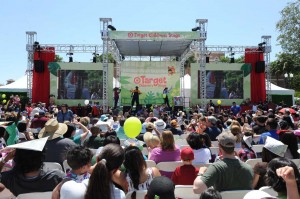Beginning to feel like home
With the onset of warmer weather and the last day of classes just a week away, one can practically hear the final sighs of spring in the air. There’s another sound, though, and it’s virtually inescapable.
It’s the pervasive clanking of tent construction.
The sea of white tents and stages around campus signals the arrival of the 17th annual Los Angeles Times Festival of Books, a sprawling, two-day celebration of reading and writing — the nation’s largest event of its kind.
This year’s event features almost 300 booths, hosting a variety of exhibitors, from booksellers and publishers to cultural organizations. There’s also a long list of intriguing participating authors, including Lakers legend Kareem Abdul-Jabbar and acclaimed food writer Jonathan Gold.
It’s worth noting that this year’s festival will mark only the second time that USC hosts the event. For 15 years, the festival took place on crosstown rival UCLA’s Westwood campus. The shift to USC’s campus was motivated by numerous factors, including the Los Angeles Times’ desire to make the event more conveniently accesible to all L.A. residents, as well as to foster future growth.
“It wasn’t that we were looking to leave UCLA, per se, but rather to move somewhere more centrally located in relation to the rest of the city,” said Maret Orliss, the senior programming manager for the Times.
Orliss noted that USC’s status as a private university also had its benefits.
“There were possibilities for USC to expand the festival that UCLA could not match — not through any fault of their own,” Orliss said, “but simply due to USC’s being a private university where you can just talk to someone to make a decision, whereas UCLA is a state university and often presents a longer process.”
The festival’s budget also raised some strife: Negotiations between the Times and UCLA regarding how to share expenses became an issue of contention, with budget cuts to the UC system making it difficult for the school to support the festival, according to a September 2010 Times report.
Ellie Launer, a junior majoring in theater at UCLA, said though it seems many current students didn’t actively participate in the festival when it was held on UCLA’s campus, the move away from the school was still disappointing.
“With all of the protests and budget cuts, I feel the festival wasn’t a huge priority [for] the school’s administrators,” Launer said. “It was a really great opportunity, though, and I had a great time. It’s a shame the underclassmen never got to see it here.”
As was hoped, the Festival of Books indeed saw growth in its first year at USC, with an unprecedented number of visitors — more than 140,000 — and a huge increase in the number of book drive donations, from 800 to 4,000. This year’s festival presents further expansion still, with more exhibitors and events than ever as well as the establishment of a food truck court on Cromwell Field — a response to visitors’ demands for more dining options in an open setting.
Other new features include a greater focus on the School of Cinematic Arts. Orliss noted a screening of the director’s cut of Watchmen that will be preceded by a discussion from representatives of DC Comics on the new Watchmen prequel comic series. Oddly enough, there will also be a live reading of an episode of My Little Pony: Friendship is Magic, which does nothing if not demonstrate the festival’s breadth.
Both school administrators and the Times have committed to having the festival at USC’s University Park Campus for an indefinite period of time.
All these actions require funding, and though neither Orliss nor the university were able to comment on the specifics of the festival’s finances, it’s safe to assume that the festival represents a hefty investment for USC.
Austin Vogel, a sophomore majoring in computer science, believes it’s all worth it.
“[The Festival of Books] attracts a lot of public attention to the university, which is obviously beneficial, and it also shows our commitment to giving back to the community in the form of a great event,” Vogel said. “It also helps independent vendors and authors to show their work.”
Jeremy Slap, a sophomore majoring in philosophy and neuroscience, put it more simply: “It’s festive, and there are a ton of books. It’s a lot of fun.”
No one is quite sure what form books and literature will take in the coming years, but this doesn’t seem to faze the festival’s coordinators. John Conroy, a spokesperson for the event, said the festival looks to address the rise of the literary journal, including the Los Angeles Review of Books, and to judiciously adapt to the dynamic development of new media.
Perhaps most telling, the Times includes a curious question on its Festival of Books “Attendee FAQ”:
“Will the festival still be a celebration of the written word?”
The answer?
“Yes. Now and always.”



Ok so this is a nice article and all, but I cannot believe that no where in this article does it say when the festival is happening!
Sure, you hyperlink to the festival website, but that’s kinda lazy guys, c’mon…
Btw, it’s this weekend, from 10 am to like 6 pm each day.